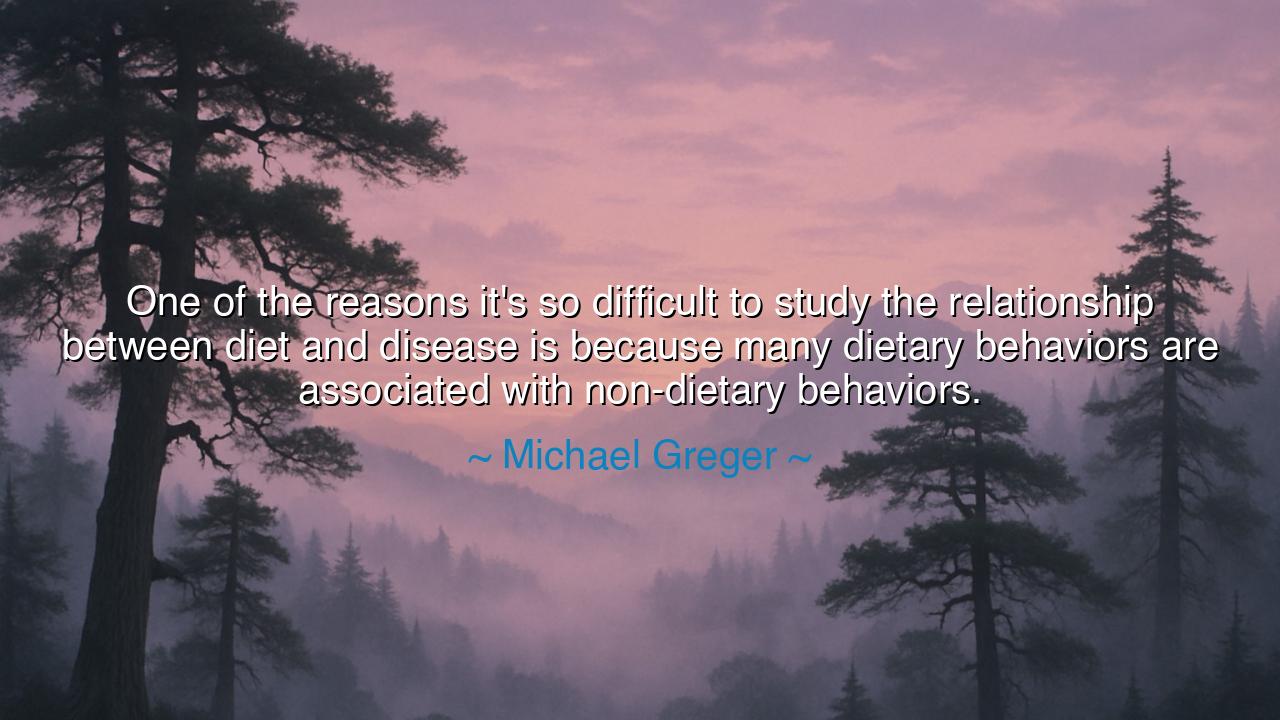
One of the reasons it's so difficult to study the relationship
One of the reasons it's so difficult to study the relationship between diet and disease is because many dietary behaviors are associated with non-dietary behaviors.






The words of Michael Greger, “One of the reasons it's so difficult to study the relationship between diet and disease is because many dietary behaviors are associated with non-dietary behaviors,” rise beyond the language of science into the realm of philosophy. For though he speaks of nutrition and research, his insight touches upon the greater mystery of human nature itself — the truth that our actions are not isolated but woven together, like threads in a single cloth. Each choice we make, whether of food or of thought, whether of body or of spirit, is connected to all others. To understand one, we must see the pattern of the whole.
When Greger speaks of dietary behaviors and non-dietary behaviors, he reminds us that the body and mind are not separate kingdoms, but two halves of the same vessel. What we eat is not only a matter of sustenance — it is an expression of who we are, of our habits, our emotions, our values, and our way of life. The person who eats in haste often lives in haste; the one who eats with reverence often lives with gratitude. Thus, when the wise seek to understand disease, they must look not only to the plate, but to the heart, the home, the spirit of the person who eats. For the sickness of the flesh often begins as the unrest of the soul.
This unity of life was known to the ancient healers. The physician Hippocrates, father of medicine, taught that food and lifestyle must be studied together, for each mirrors the other. He saw that those who consumed heavily were often those who worked little, and those who lived amidst anger or sorrow suffered ailments that no herb could fully cure. To heal, therefore, required more than treatment — it required transformation. Likewise, Greger’s observation is not merely about the difficulty of study; it is about the complexity of human behavior, and the humility required to approach truth. The body is an ecosystem, but so is the life that surrounds it.
Consider, for example, the history of the industrial diet — the foods of convenience that swept through the modern world in the last century. At first, researchers sought only to measure calories and nutrients. But they soon discovered that those who consumed these foods often shared other non-dietary behaviors: less sleep, less exercise, more stress, and less connection to the rhythms of nature. To study only the food without the life that contains it is to gaze upon a single star and try to know the whole sky. It is not enough to know what people eat; one must also know how they live.
The wise have always known that habits are not born in isolation. A man who rises early to tend his garden does not only grow vegetables; he cultivates patience, discipline, and gratitude. The one who eats freshly from that soil partakes in the virtues that nourished the harvest. But one who eats in distraction, in anger or in loneliness, consumes not only food but the energy of his own unrest. Thus, when Greger says it is difficult to study diet and disease, he means that every meal is a story — shaped by culture, by emotion, by circumstance. To untangle the influence of food from the fabric of life is to separate flame from fire.
The story of Dr. Dean Ornish offers a living example of this truth. In his studies on heart disease, he found that recovery was not achieved by diet alone, but by a harmony of changes — plant-based eating, meditation, exercise, and love. Each element supported the others, for the heart, he saw, is not healed merely by food, but by wholeness. In this way, Ornish and Greger speak the same language of wisdom — that to heal the body, one must heal the way of being. Disease is not a single enemy to be conquered, but a disharmony to be resolved.
So let this be the teaching: Life cannot be divided. What we eat, how we move, what we think, and how we love — all flow from the same source. To live wisely, one must cultivate awareness in all things, for each choice ripples through the whole being. When you eat, eat with presence. When you move, move with joy. When you rest, rest with peace. Let no part of your life fall into neglect, for neglect in one becomes sickness in all.
And remember, as Michael Greger reminds us, that understanding health is not about perfect control, but about seeing connection. The body is a mirror of the spirit; the plate, a reflection of the world we build. To eat with mindfulness is to heal both the self and the earth. To live with balance is to restore harmony to all that we touch. For in the end, the mystery of diet and disease is the mystery of life itself — and only those who live in wholeness can truly be well.






AAdministratorAdministrator
Welcome, honored guests. Please leave a comment, we will respond soon